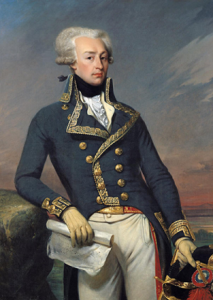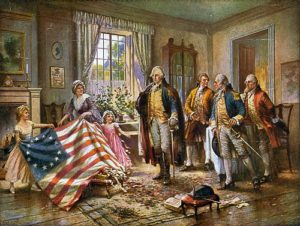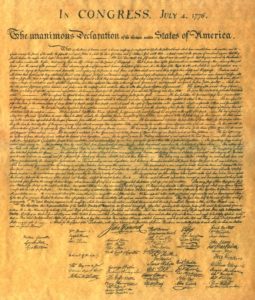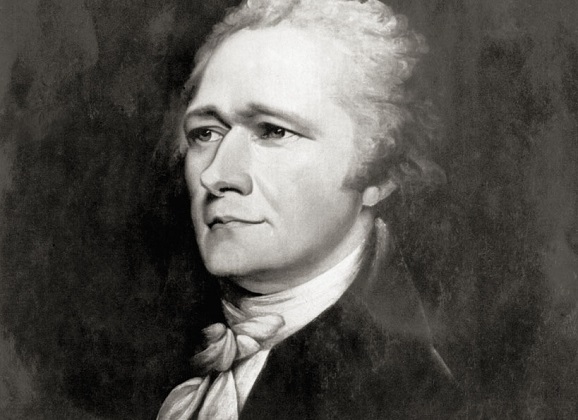As horrible as it sounds, many of us do not know nearly as much about the Revolutionary War as we should. Our forefathers were real people not just stories in history books. They had friends, love, pride and most importantly determination. We are talking about a time when England had their hands in everything and it was completely unheard of to rebel against them, and unprecedented to actually win. America, with its group of ragtag guys and their dream of being free, rose up and refused to be oppressed by the English taxes. Imagine the fearless passion it took from these men, our  forefathers, with a dream to take a stand and create something for the future generations to enjoy and appreciate.
forefathers, with a dream to take a stand and create something for the future generations to enjoy and appreciate.
Anyone who knows even the slightest about me knows politics is not my forte, so why am I suddenly bursting into tears over the comradery between Marquis de Lafayette and Alexander Hamilton, or the fact that Aaron Burr’s jealousy led to Hamilton’s untimely demise? It is all thanks to Lin-Manuel Miranda’s musical “Hamilton: An American Musical” and my two best friends. I know how to manage my addiction to show-tunes and it requires me avoiding them. However, two weeks ago I was thrust into listening to it all day which has turned into really focusing on the words. Miranda wrote this musical to be historically accurate while remaining entertaining and somehow has piqued my interest in all aspects of the revolution.
I know when I was in school, history was the worst subject for me to listen to. It was the same story over and over again. However, I know for a fact if we got more in detail of these men’s personal lives things would have been different. “Hamilton: An American Musical” has brought to light the real pain of these revolutionary men. How many of us knew that that Hamilton and George Washington, our first president, were incredibly close and that he was Washington’s “right hand man”? How many of us knew of Hamilton’s sex scandal or the feuds between party leaders? These people were real and so were their behaviors and political ideologies. When you take a personal look at our history in America, things get a lot more emotional.
 So why do our students find history to be so “boring?” A recent graduate of Arizona State University, history teacher Andrew Williams, gave me insight to this. As a child growing up in the environment of the 21st century, it is hard to even imagine life without the internet. Imagine them trying to make mental images of people in the past fighting wars with muskets and horses. Williams states, “Students need as many visuals as possible when it comes to history because it’s so hard for them to picture people, places and events that happened in the past. This helps them foster something called ‘historical empathy.’” When I was in middle school and high school I know that is not how I was given history lessons.
So why do our students find history to be so “boring?” A recent graduate of Arizona State University, history teacher Andrew Williams, gave me insight to this. As a child growing up in the environment of the 21st century, it is hard to even imagine life without the internet. Imagine them trying to make mental images of people in the past fighting wars with muskets and horses. Williams states, “Students need as many visuals as possible when it comes to history because it’s so hard for them to picture people, places and events that happened in the past. This helps them foster something called ‘historical empathy.’” When I was in middle school and high school I know that is not how I was given history lessons.
After listening to “Hamilton: An American Musical,” more than I’d like to admit, visuals are what I got. Musicals have a way of singing a story to you, so you don’t need to see the actors behind it; you can picture exactly what they are doing. You can hear the emotion and passion in their voices, to the point that it feels they are the real people fighting the war in the 1700s. That is what is missing from history classes in America: passion and pride. Too many kids find history to be pointless and in turn  are losing a very valuable piece of our history as Americans. Our founding fathers fought for freedom, as the musical sings, “Look, when Britain taxed our tea, we got frisky.” They fought for freedom so that future generations can write, speak and do what they feel they need to succeed and survive. So maybe next time you pull out your cash to buy something, think of the guy on that piece of paper. It’s not just a portrait of an old guy, it’s a picture of history, of someone that loved America and all it could be and loved the idea of you.
are losing a very valuable piece of our history as Americans. Our founding fathers fought for freedom, as the musical sings, “Look, when Britain taxed our tea, we got frisky.” They fought for freedom so that future generations can write, speak and do what they feel they need to succeed and survive. So maybe next time you pull out your cash to buy something, think of the guy on that piece of paper. It’s not just a portrait of an old guy, it’s a picture of history, of someone that loved America and all it could be and loved the idea of you.

















